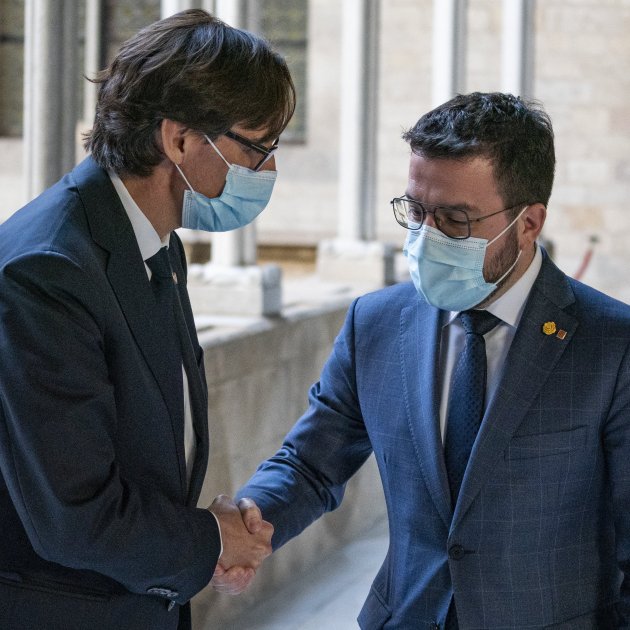The unionist Catalan Socialist Party (PSC) and the pro-independence Catalan Republican Left (ERC) are once again the two political forces that would obtain most support in elections to the Parliament of Catalonia, and the difference between them would not be statistically significant, so it is likely that the current situation of technical tie would be repeated. That's the prediction from the latest survey from Catalonia's publicly-run polling agency, the CEO, released this Thursday, and its first full electoral "barometer" since the elections of February 14th, 2021, with interviews carried out from March 1st to 28th via personal doorstep surveys of 2,000 individuals. Thus, the poll asserts that the PSC could take between 34 and 39 seats - currently, it has 33 - and ERC would claim between 33 and 38, when it also has 33. Together for Catalonia (Junts) would remain as the third largest force but with fewer seats than the 32 it has now: according to the survey, it would win between 23 and 28 deputies.
As for the rest of the parties, there are not many differences in relation to the current seating distribution in the Catalan chamber, determined at the election 14 months ago. The fourth largest party would once again be the extreme right party, Vox, with a forecast of between 9 and 12 seats, when it currently has 11. The pro-independence left-wing CUP currently has 9 deputies and again would come fifth, with between 8 and 11 seats. Similar stability for the left-wing Comuns, which currently has 8 deputies and is expected to win between 6 and 10. One party continues to sink like a stone - Ciudadanos (Cs) - from 36 deputies in 2017, to 6 deputies a year ago, and now, in danger of not reaching the threshold for parliamentary representation - specifically, between 0 and 4 deputies, says the CEO. The only good news for the unionist right is for the People's Party (PP), which currently has 3 seats and is predicted to rise to between 6 and 8.
With regard to the expected voter turnout - bearing in mind that the February 14th, 2021 vote took place in the midst of the Covid pandemic - a reduction in abstention of about 450,000 people is predicted, a fact that mainly benefits the PSC and ERC, with the Socialists expected to receive a net balance of about 190,000 extra votes, and ERC, about 135,000 more.
Preferred leaders
As for the ratings of political leaders, the most appreciated is the ERC president, Oriol Junqueras - not part of the current Catalan government - with 5.3. In second place, his party colleague who does head the government, Pere Aragonès, although at 4.9 he does not get a pass mark. Third place is occupied by the Comuns spokesperson in Congress, Jaume Asens, who obtains 4.6. The same score is obtained by CUP deputy Eulàlia Reguant. The lowest ranked politicians are those on the right: Carlos Carrizosa (Cs) obtains only 2.0; Ignacio Garriga (Vox), 2.1; and Inés Arrimadas (Cs), 2.3.
In this ranking of preferred leaders, president in exile Carles Puigdemont occupies only ninth position, although the Junts party leader leads the ranking of the leaders best known by the public, and is also the highest ranked by Junts voters.
The Catalonia-Spain relationship
On the relationship between Catalonia and Spain, 81% of respondents are in agreement or strongly in agreement that Catalans have the right to decide their future as a country in a referendum. With regard to the independence question itself, opponents to independence are 48% of people surveyed while 44% are in favour of an independent Catalonia. It is a result similar to that recorded by previous barometers. According to the director of the CEO, Jordi Muñoz, there is a "stagnation and stability" of these positions since the summer of 2019.
Regarding the positioning on independence when cross referenced by party preferences, Junts and the CUP are the two parties with most independence supporters in their ranks: 97% of sympathizers of the two groups declare themselves pro-independence. In the case of ERC voters, 85% says they want independence and 10% say that they don't.
